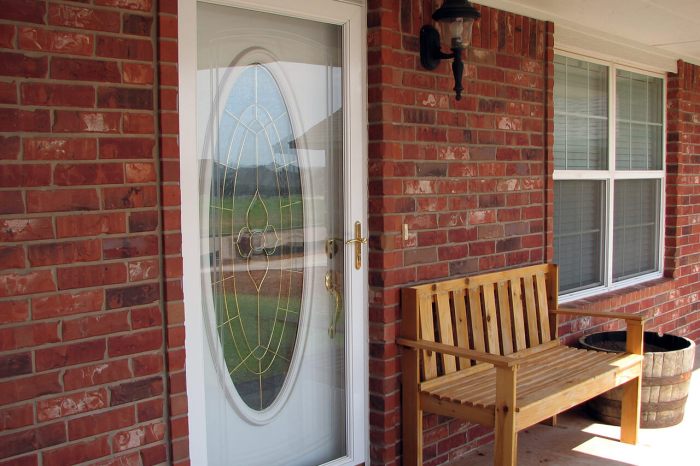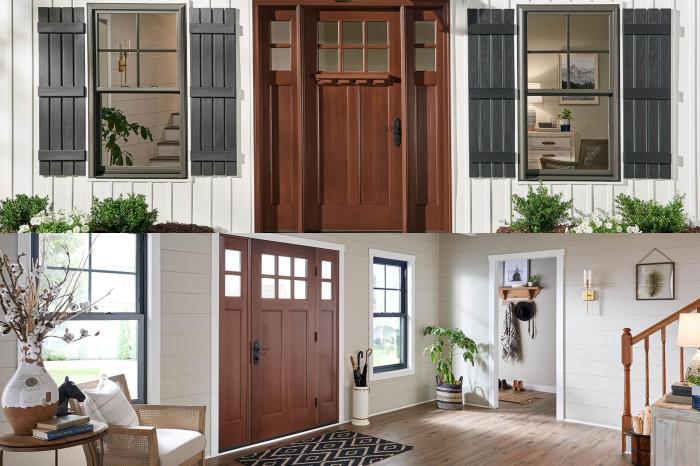Expert Pergola Installation Services: Everything You Need to Know
Step into the world of pergola installation services, where craftsmanship meets innovation. From the initial concept to the final touches, discover the artistry and precision behind creating the perfect outdoor oasis.
Delve into the realm of pergolas as we explore different designs, materials, costs, and maintenance tips, ensuring your pergola stands the test of time.
Overview of Pergola Installation Services
When it comes to pergola installation services, it involves the professional installation of pergolas, which are outdoor structures typically used to create a shaded walkway, passageway, or sitting area in a garden or backyard.
Hiring professionals for pergola installation comes with several benefits, including ensuring proper installation, saving time and effort, and guaranteeing a durable and long-lasting structure that adds value to your outdoor space.
Typical Process Involved in Pergola Installation
- Site Assessment: The installation team will assess the area where the pergola will be installed, taking into account factors such as terrain, sunlight exposure, and existing structures.
- Design Consultation: Professionals will work with you to determine the design, size, and materials for the pergola that best suits your preferences and outdoor space.
- Permitting and Approvals: If required, the installation team will handle the necessary permits and approvals before commencing the installation process.
- Preparation: This involves preparing the site, clearing the area, and ensuring a solid foundation for the pergola structure.
- Installation: The team will assemble and install the pergola according to the approved design, ensuring proper alignment, stability, and finishing.
- Finishing Touches: To complete the installation, finishing touches such as painting, staining, or adding decorative elements may be done to enhance the overall look of the pergola.
- Final Inspection: Once the installation is complete, a final inspection will be carried out to ensure everything is in place and meets the necessary standards.
Types of Pergola Designs
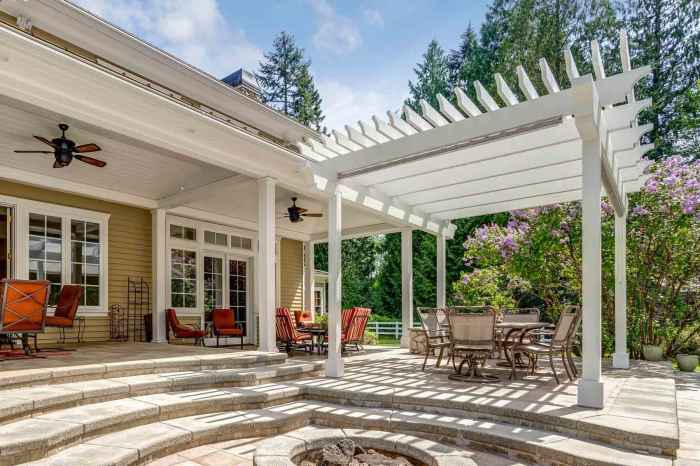
When it comes to pergola designs, there are several options to choose from based on your preferences and requirements. Each design offers unique features and aesthetics to enhance your outdoor space.
Traditional Pergola
- A classic design with evenly spaced rafters and open sides.
- Provides partial shade and a sense of enclosure without blocking views.
- Perfect for adding a touch of elegance to your garden or patio.
Modern Pergola
- Clean lines, minimalistic structure, and often made of materials like metal or fiberglass.
- Creates a contemporary look that complements modern architecture.
- Can be customized with adjustable louvers or shades for versatility.
Arched Pergola
- Features an arched roof for a more decorative and ornate appearance.
- Adds a touch of sophistication and charm to any outdoor space.
- Great for creating a focal point or defining an entryway.
Gabled Pergola
- Roof design mimics a house gable with two sloping sides meeting at a peak.
- Provides better protection from the elements and allows for hanging plants or lights.
- Enhances the overall architectural appeal of your outdoor area.
Freestanding vs. Attached Pergola
- Freestanding pergolas stand independent of any structure, offering more flexibility in placement.
- Attached pergolas are connected to a building, creating a seamless extension of the existing structure.
- Both types have their unique advantages based on the layout of your outdoor space.
Materials Used in Pergola Installation
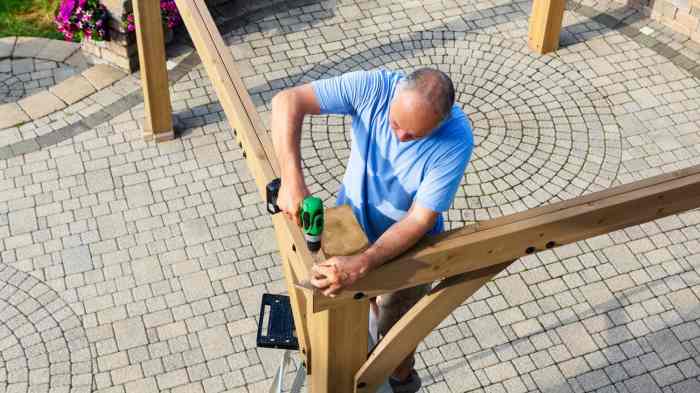
When it comes to pergola construction, there are several common materials that are often used to build these outdoor structures. Each material has its own set of characteristics, including durability, maintenance requirements, and overall cost. Let's take a closer look at some of the materials typically used in pergola installation.
Wood
Wood is a popular choice for pergolas due to its natural and rustic look. Common types of wood used include cedar, redwood, and pressure-treated pine. Wood pergolas are durable and can last for many years with proper maintenance, such as staining or sealing to protect against the elements.
However, wood pergolas may require more upkeep compared to other materials, as they are susceptible to rot, warping, and insect damage.
Aluminum
Aluminum is another material commonly used for pergola construction. Aluminum pergolas are lightweight, durable, and virtually maintenance-free. They are resistant to rust, corrosion, and fading, making them a long-lasting option for outdoor structures. While aluminum pergolas may have a higher upfront cost compared to wood, the minimal maintenance requirements can make them a cost-effective choice in the long run.
Vinyl
Vinyl pergolas are a low-maintenance option that can mimic the look of wood without the upkeep. They are easy to clean, resistant to rot and pests, and do not require staining or sealing. Vinyl pergolas are durable and can withstand harsh weather conditions, making them a long-lasting choice for outdoor spaces.
While vinyl pergolas may have a higher initial cost, the savings on maintenance over time can make them a cost-effective option.
Steel
Steel pergolas offer a modern and sleek aesthetic to outdoor spaces. They are strong, durable, and resistant to rot, pests, and weather damage. Steel pergolas are typically powder-coated to prevent rust and corrosion, ensuring longevity and minimal maintenance requirements. While steel pergolas may have a higher upfront cost, their durability and low maintenance needs can make them a worthwhile investment for homeowners.
Cost Factors and Pricing
When it comes to pergola installation services, understanding the cost factors and pricing is essential for planning your project effectively. Let's break down the key components that contribute to the overall cost of pergola installation and provide some tips on estimating the expenses involved.
Cost Components of Pergola Installation Services
- The size of the pergola: Larger pergolas typically require more materials and labor, resulting in higher costs.
- Material selection: The type of material used for the pergola, such as wood, vinyl, or aluminum, can significantly impact the overall cost.
- Design complexity: Elaborate designs with intricate details or custom features may require more time and resources, leading to increased costs.
- Site preparation: Factors like terrain, existing structures, and landscaping can affect the amount of preparation work needed, influencing the final price.
Tips for Estimating the Cost of a Pergola Installation Project
- Get multiple quotes from different pergola installation services to compare prices and services offered.
- Consider the size, material, and design of the pergola you want to install to get a more accurate estimate.
- Factor in additional costs such as permits, site preparation, and any customization or add-ons you may want for your pergola.
- Ask for a detailed breakdown of costs from the pergola installation providers to understand what is included in the price quote.
Factors Affecting the Pricing of Pergola Installation Services
- Location: The cost of labor and materials can vary depending on the region or city where the pergola installation is taking place.
- Seasonal demand: Prices may fluctuate based on the time of year, with peak seasons potentially leading to higher costs due to increased demand.
- Supplier pricing: Material costs can be influenced by market conditions, availability, and the supplier's pricing policies.
- Customization and add-ons: Additional features, finishes, or customization options can add to the total cost of the pergola installation.
Finding the Right Pergola Installation Service Provider
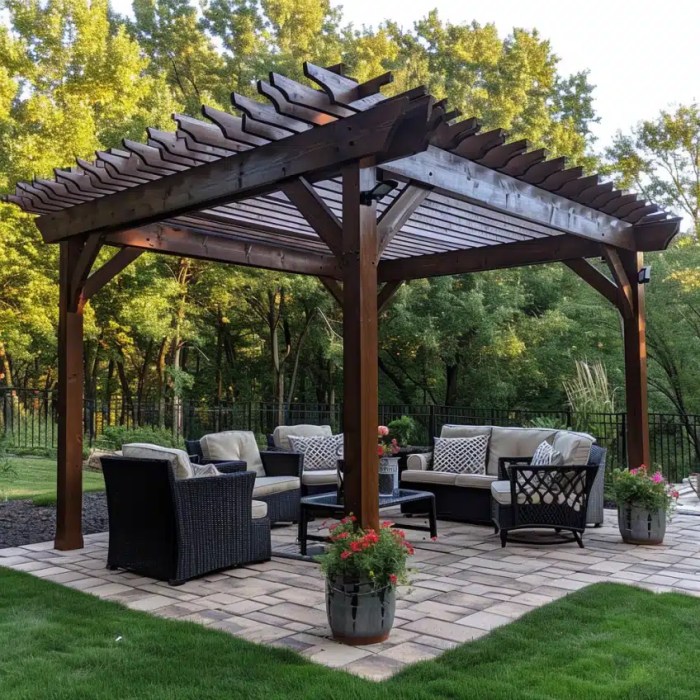
When looking for a pergola installation service provider, it is essential to do thorough research to ensure you select a reliable and skilled professional for the job. Here are some steps to help you find the right pergola installer:
Research and Select a Reliable Provider
- Start by asking for recommendations from friends, family, or neighbors who have had pergolas installed recently.
- Check online reviews and ratings on platforms like Google, Yelp, or Angie's List to get an idea of the installer's reputation.
- Visit the websites of different installation companies to learn more about their services, experience, and customer testimonials.
Importance of Checking Credentials and Reviews
- Verify that the pergola installation service provider is licensed, insured, and bonded to protect yourself and your property.
- Read customer reviews and testimonials to gauge the quality of their work and customer satisfaction levels.
- Check for any complaints or negative feedback against the installer to ensure you are making the right choice.
Ensuring Quality Workmanship and Professionalism
- Ask for references from past clients and follow up with them to inquire about their experience with the installer.
- Request to see photos of previous pergola installations to assess the quality of their work and craftsmanship.
- Discuss the installation process, timeline, and warranty options with the service provider to ensure they meet your expectations.
Maintenance and Care for Pergolas
Regular maintenance is essential for keeping your pergola in top condition and preserving its beauty for years to come. By following a maintenance schedule and addressing any issues promptly, you can ensure that your pergola remains a functional and attractive addition to your outdoor space.
Importance of Regular Maintenance
- Regular maintenance helps prevent damage caused by weather exposure, such as rotting wood or rusting metal.
- Proper care extends the lifespan of your pergola, saving you money on repairs or replacement in the long run.
- Maintaining your pergola enhances the overall look of your outdoor area, adding to the aesthetics of your property.
Maintenance Checklist for Pergola Owners
- Inspect for any signs of damage, such as cracks, warping, or loose fasteners.
- Clean the pergola regularly to remove dirt, debris, and mold or mildew growth.
- Check the structural integrity of the pergola, ensuring that it is stable and secure.
- Apply a fresh coat of sealant or paint as needed to protect the wood or metal from the elements.
Common Issues and How to Address Them
- Rotting Wood: Replace any rotted sections of wood and apply a wood preservative to prevent future decay.
- Rusting Metal: Remove rust with a wire brush, treat with a rust converter, and apply a rust-resistant paint.
- Sagging or Leaning Structure: Reinforce the pergola with additional support beams or braces to correct the issue.
- Mold or Mildew Growth: Clean the affected areas with a mixture of water and mild detergent, then rinse thoroughly.
Summary
As the sun sets on our exploration of pergola installation services, remember that the key to a lasting pergola lies in attention to detail. Whether it's choosing the right design or maintaining its beauty, let your pergola be a symbol of relaxation and sophistication in your outdoor space.
FAQ Corner
What are the benefits of hiring professionals for pergola installation?
Professionals ensure precise installation, saving time and effort while guaranteeing a high-quality result.
How can material choice impact the overall cost of pergola installation?
The choice of materials can significantly affect the cost, with options ranging from budget-friendly to high-end selections.
What steps can one take to find the right pergola installation service provider?
Research thoroughly, check credentials, read reviews, and ensure quality workmanship for a reliable choice.
Why is regular maintenance important for pergolas?
Regular maintenance ensures longevity and preserves the aesthetics of the pergola over time.
